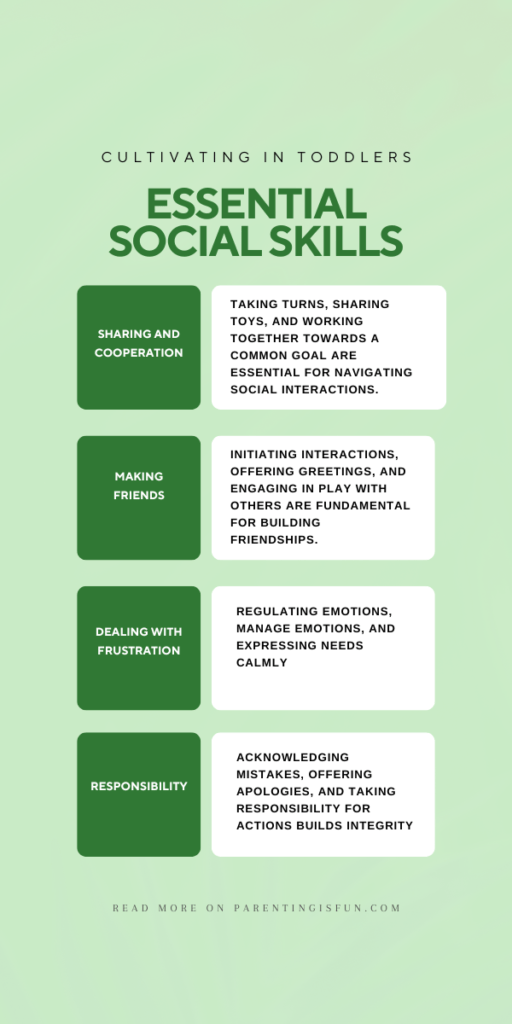Table of Contents
Social skills need to embark toddlers on a remarkable journey of social discovery. From the shy glances at the playground to the gleeful shouts shared in a bubble bath. During these fleeting yet formative years, laying the foundation for strong social skills becomes crucial for their future growth and happiness. But how do we, as parents and caregivers, navigate this whirlwind and nurture little social butterflies? Read on to discover 10 key social skills and simple, effective ways to cultivate them in your little one:
1. Communication
The Skill
Expressing wants and needs, making observations, asking questions, and listening attentively are all vital aspects of communication.
How to Cultivate
Encourage babbling and respond with playful sounds and words. Narrate your actions and point out objects, modeling clear pronunciation and articulation. Sing songs, read books, and engage in simple conversations, patiently waiting for their responses.
2. Empathy
The Skill
Recognizing and understanding the emotions of others is the cornerstone of empathy.

How to Cultivate
Label your own emotions (“I feel happy when you help me!”) and point out expressions on others’ faces (“See, your friend is sad, let’s hug her”). Read stories with diverse characters and discuss their feelings. Encourage comforting behavior during playtime and real-life situations.
3. Sharing and Cooperation
The Skill
Taking turns, sharing toys, and working together towards a common goal are essential for navigating social interactions.
How to Cultivate
Provide ample opportunities for parallel and cooperative play. Offer simple tasks like building a block tower together and gently guide turn-taking during games. Use positive reinforcement when they share and express excitement at their cooperation.
4. Problem-Solving: Essential social skills
The Skill
Problem solving skills like resolving conflicts peacefully, navigating disagreements, and finding solutions are key life skills.
How to Cultivate
Model conflict resolution with your own interactions. Guide toddlers through verbal expression of their needs and encourage compromise. Role-play different scenarios and offer positive alternatives to aggression.
5. Following Rules and Routines
The Skill
Understanding and respecting boundaries and expectations fosters self-regulation and social harmony.
How to Cultivate
Establish clear, consistent routines and rules explained in simple terms. Offer choices within predictable structures. Use positive reinforcement and gentle redirection when rules are broken, explaining the consequences calmly.
6. Making Friends
The Skill
Initiating interactions, offering greetings, and engaging in play with others are fundamental for building friendships.
How to Cultivate
Provide opportunities for interaction with other children during playdates, park visits, or baby groups. Model friendly greetings and encourage your child to offer them as well. Encourage sharing and taking turns during play to facilitate positive bonds.

7. Accepting Differences
The Skill
Recognizing and appreciating individual differences in appearance, abilities, and backgrounds fosters inclusivity and respect.
How to Cultivate
Read books with diverse characters and discuss their unique qualities. Point out differences in your community and celebrate them. Encourage positive interactions with children from different backgrounds and emphasize kindness and inclusion.
8. Dealing with Frustration
The Skill
Regulating emotions, managing frustrations, and expressing needs calmly are important for healthy social interactions.
How to Cultivate
Validate your child’s emotions (“I see you’re feeling frustrated”). Offer calming strategies like deep breaths or counting. Model healthy coping mechanisms like taking a break or asking for help. Gradually replace tantrums with verbal communication of needs.
9. Showing Appreciation
The Skill
Expressing gratitude and recognizing the kindness of others fosters positive social interactions and builds connections.
How to Cultivate
Model saying “thank you” and “you’re welcome” in daily interactions. Encourage your child to say thank you to others who help them. Point out acts of kindness and celebrate them as a family.
10. Taking Responsibility
The Skill
Acknowledging mistakes, offering apologies, and taking responsibility for actions builds integrity and fosters healthy relationships.
How to Cultivate
Guide your child through the process of apologizing after an accident or disagreement. Model taking responsibility for your own mistakes and emphasize learning from them. Offer age-appropriate chores and opportunities to contribute, praising their efforts.
Remember, fostering social skills in toddlers is a gradual process. Patience, consistency, and positive reinforcement are key. Embrace the journey, celebrate their milestones, and enjoy watching your little one blossom into a confident and socially adept individual!
Additional Tips
Observe and adapt
Pay attention to your child’s individual temperament and adjust your approach accordingly.
Embrace play
Play is the natural language of toddlers. Use unstructured playtime and guided activities to develop social skills.
Be a role model
Remember, your child learns best by observing your behavior. Demonstrate all the social skills you want to cultivate in them through your own interactions with others.
Seek support
If you encounter challenges or have any concerns about your child’s social development, don’t hesitate to seek professional guidance from a pediatrician, psychologist, or early childhood educator.
Celebrate the journey
Remember, developing strong social skills takes time and effort. Celebrate every small win, from sharing a toy to expressing empathy, and acknowledge their progress with genuine enthusiasm.
Conclusion
By prioritizing these essential skills and embracing the unique journey of each child, we can equip them with the social tools they need to thrive and build meaningful connections throughout their lives. Remember, every interaction, every giggle shared, and every conflict navigated contributes to shaping their social butterfly wings, empowering them to soar high in the tapestry of human connection.
